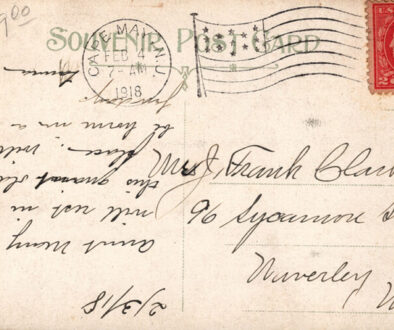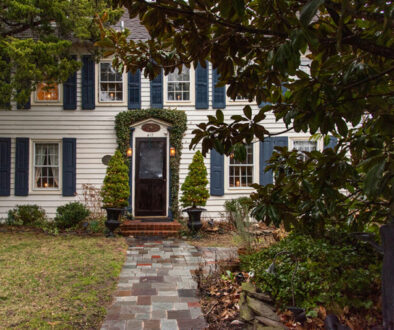Kevin Beare

If you never thought that strolling Cape May’s gaslit streets or walking along our promenade would afford you the chance to view the rings of Saturn or study the details of a nebula thousands of light years from Earth, then you’ve never encountered our island’s street corner astronomer, Kevin Beare. With two state-of-the-art telescopes, affectionately named Hannah and Marley, which capture high-definition images despite light pollution, Kevin introduces pedestrians to breathtaking views of the farthest reaches of our galaxy and beyond.
Even more unusual than discovering cosmic wonders from Cape May’s Victorian streets is the daytime profession of this sociable stargazer. Kevin works as a funeral director at Spilker Funeral Home on Washington Street, and that is where he discussed with me his passion for finding life’s purpose and universal wonder.
Q: What did you want to be when you grew up?
A pilot. I was always fascinated with airplanes. My family was in the boating industry, but I was always at the airport.
Q: Did that lead to your interest in astronomy?
My interest in astronomy began when I was eight years old, when my grandmother introduced me to my first meteor shower. I was flabbergasted by the lights just shooting by. When she said it was time to go in, I kept saying to her, ‘Just one more, just one more.’
Q: When you see a meteor now, do you ever make a wish on it?
I rarely do. I am just so appreciative of having the experience. A meteor can be as small as a grain of sand. I’ve read that there is two tons of space dust each day that enters our atmosphere.
Q: Which was the best meteor shower you have ever experienced?
The best was in November of 2001. It was predicted that it was going to be a good night for it, and I went up to Belleplain where there’s a big astronomy field. There were meteors all night long. We saw some huge fireballs. There was one that was so bright that I saw my shadow on the ground.
Q: When did you first have a telescope?
I got my first telescope while living in North Carolina. I was in my early 40s and my secretary, Judy, bought it for me. I was able to see the moon very well and the rings of Saturn. I moved back here in 2014 and began working here at the funeral home for Dennis in 2015. Covid was my silver lining because then I started investigating telescopes.
Q: Do you see a common thread between astronomy and mortuary science?
I really do. I call it the beauty in the darkness. Since I was a child, I always enjoyed finding peace while just looking up into the darkness. As I’ve learned more about our solar system and beyond, I can say that as a funeral director, I don’t know what happens when we die—but as Carl Sagan says, ‘We’re all made of the same star dust.’
Q: Do you experience anything from a spiritual realm in either of these fields?
There is a story I share. In 2007 I was 300 miles away in North Carolina. I woke from a dead sleep on March 14th at 1:30 in the morning, I sat up and said out loud, ‘Bill Spilker.’ Bill was Dennis’ dad. I was wondering why I had woken out of a dead sleep saying his name. Later that day, Dennis called me to tell me his dad had died at 1:30 that morning.
Q: How do you explain that?
I call them gifts.
Q: From where?
Higher places. Mr. Spilker was a very religious man. When one sun dies, it creates a thousand new ones. I can’t tell you what happens after we die, but I can tell you there is movement in death. That’s how I explain him coming to wake me up at 1:30 in the morning. I know that when we expire, we are dead, but there is something within us that moves. That’s when I think about the universe and knowing that we’re made of the same star stuff. So, I call them gifts.
Q: Do you ever experience such gifts in directing someone’s funeral?
Directing someone’s funeral is an honor. It’s a very precious thing to be honored enough to be responsible for the burying of someone. This is a wonderful profession that gives me more than I give it.
Q: Were you exposed to death and funerals much as a child?
After my grandfather died when I was in fourth grade, I began having interest in funeral ceremonies. During 5th, 6th and 7th grade, I would take the bus home from Teitelman and we’d go past Cold Spring Church and that’s about the time when funeral services would show up. When I got home, I would get on my bike and go out and observe them. My other grandfather passed in 1981. The funeral was here when John Sudak was director. My grandmother dropped her watch in the parking lot. I volunteered to come back to pick up the watch and began speaking to Mr. Sudak and asked him for a job that night. There’s purpose in life, if it weren’t for that watch I don’t know if I’d be sitting here right now. That’s the wonderful thing about life.
Q: Would you say the cause of those life events and that purpose are works of a higher power?
People ask me if I believe in God, and I do believe in a higher spirit and I believe we’re all miracles here.
Q: Many people would find it difficult to handle or prepare the deceased for burial.
The body is the most amazing thing. We are such a miracle. To think, we can cut ourselves and self-heal. The brain is divided into two spheres so if we have a stroke, it only affects one side of our body. The body is perfect. Funeral work is challenging, it’s emotional and I cry at times. I have always said that if I no longer cry then I need to get out of the business.
Q: Apollo astronaut Edgar Mitchell claimed to have a spiritual revelation in space which made him see the universe itself as having consciousness. He discovered that other astronauts shared the same extraterrestrial experience.
Yes, that’s similar to what’s called the overview effect, in which astronauts are in orbit and looking down with a new understanding of our home. That’s got to move you! I’ve always thought that if we could get everyone on earth to experience that, our world would be a better place. I don’t believe we need more rules and regulations; we need to start teaching about our universe and what miracles we all are here.
Q: Does working with death
strengthen compassion?
I carry spiders outside because they are living things. I have compassion for every living thing to the extreme of counting birds and ducks flying in a V-formation. If there is an odd number of geese, I pray for that odd number. They mate for life, so if there is an odd number, you know one has passed.
Q: Were you like that as a child?
After my grandfather died in 1973, when I would find a dead toad or dead bird in the back yard, I would get paneling my dad had and make a small casket. I’d line it with some velvet my mom had left over in her sewing drawer. Mom and Dad would come out, I’d recite the 23rd Psalm, because that’s what the minister did, I got flowers from the neighborhood and put them on the grave. That’s just me. It’s what has allowed me to become a compassionate funeral director and someone who enjoys sharing the beauty and the darkness in the story of life.
Q: Does looking at the vastness and wonder of the universe make you feel tiny and insignificant, or does it make you feel one with all its majesty?
Both. It makes me feel wonderfully insignificant. We’re all connected to everything.
Q: Do you believe we have an eternal soul?
Absolutely.
Q: I recently heard a rabbi speak about the belief that the dead body can still retain part of the soul and to cremate the body would be a travesty. Can you comment on that?
That is what is so fascinating about religion; everyone is brought up in different spiritual ways. All I can tell you is that what Mr. Spilker gave me at 1:30 in the morning back in 2007 was that I believe his soul left immediately and went to me over 300 miles away in a wonderful way. Personally, I believe that when we pass, our soul moves on. When I was first starting my apprenticeship there was a little boy who was attending his first funeral—the funeral of his grandfather. I explained to him that his grandfather is much like a peanut—the shell is in the casket, but the peanut is gone. I don’t want to minimize that the human body is a peanut, but it enabled me to explain that the human body is a shell. When a human body dies, the skin changes immediately. The color goes and I believe that’s when the soul goes. I think it’s a gift to see someone pass. I believe that we just don’t end. We move. That’s hope. Someone said we should live our lives today and not be concerned with what happens after we die. I think you can do both, to live in the moment for your best life and to live with purpose.
Q: I’d be remiss if I didn’t ask about modern funeral arrangements in which people can have their cremated remains sent into space.
There are different companies that are taking remains and putting them in a lipstick-sized container and sending them into space. There are some I believe that will aim it toward the moon where it crashes into the surface.
Q: Would you consider that for yourself?
I’d rather go into space while I’m alive and see the earth. I hope to make that happen someday either on the Blue Origin or a SpaceX rocket. I believe I will have that opportunity.
Q: I’ve spoken to people who’ve really been excited about discovering you on the street with your telescopes.
That’s what is so wonderful about street corner astronomy. It’s like a magnet. As soon as I set up my telescopes, people gather and ask what I’m doing. I want to give them the opportunity to think and to give children the opportunity to see their first planet or first nebula. It’s a gift to offer people unexpected pop-up experiences. Just to have conversations with people about the universe and the preciousness of life is a wonderful thing to share. They often ask if I work for NASA, and I tell them I am a funeral director, and they start laughing.
Q: But I did hear that you are in fact going to be associated with NASA in some capacity.
I’ve been accepted into NASA’s Solar System Ambassador Program. It’s a program that offers the public information about real missions that explore our solar system. I am required to do four public events per year and will tie them into events at the Cape May Point Science Center.
Q: Wow! That will be a great addition to the programs they are offering.
Bob Mullock asked me to do programs starting in April at the Cape May Point Science Center. I’ll be giving the classes each month on a Saturday night closest to the new moon for clear visibility.
Q: You’ve come a long way since the first time your grandmother took you outside to watch the meteor shower.
My grandmother influenced me in a wonderful way. That’s the gift she gave me, and I am trying to do my part to give back to others. I call it purpose; I love to share how special we are. When I’m on the streets of Cape May with the telescopes set up, people always ask why I am not somewhere remote in a darker place, and I answer, “Because I wouldn’t have met you.”
Kevin’s updates and space images can be followed on Instagram @capemayastro



